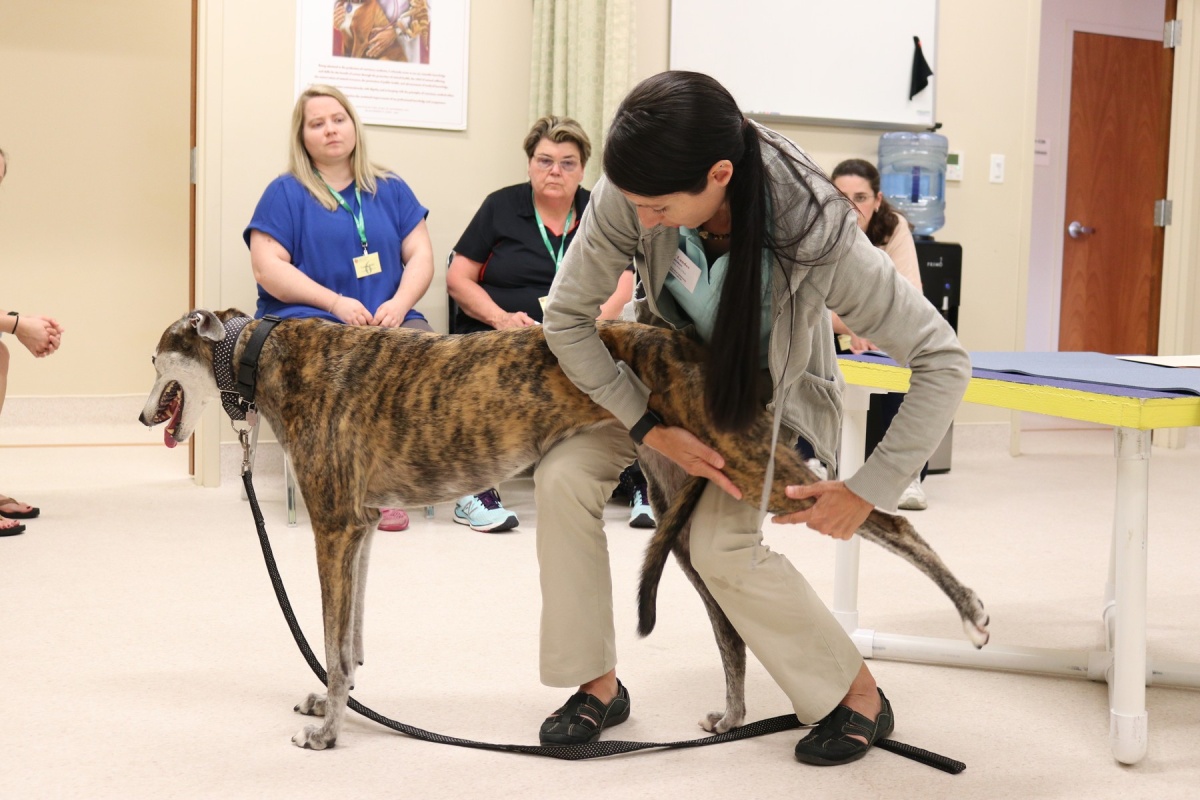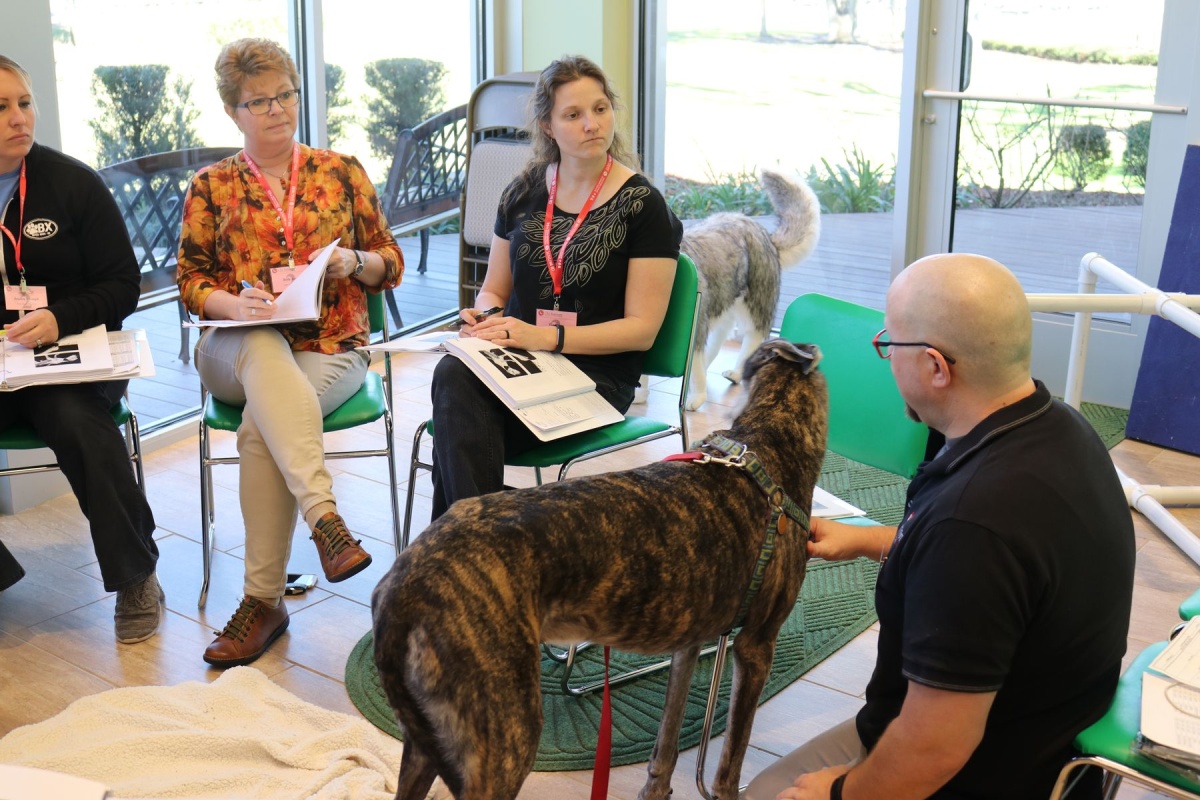
Program Overview
The Certified Veterinary Medical Manipulation Practitioner (CVMMP) small animal track is a 107 CE-hour program (approved by AAVSB RACE) that trains and certifies veterinarians in Small Animal Veterinary Medical Manipulation (SAVMM). This program is offered only to licensed veterinarians and 3rd or 4th year veterinary school students, providing them with the opportunity to learn SAVMM more efficiently and effectively, while taking their skills and knowledge to a deeper level. The Veterinary Medical Manipulation (VMM) certification course is comprised of 3 hybrid sessions, with 3 online modules and 3 on-site visits at the Chi University campus in Reddick, Florida, USA.
32 hours of the program are set aside for intensive, hands-on wet lab learning in small groups with dogs. The lab groups are small with 4 - 6 students per dog to ensure that each student receives the maximum amount of individual attention and hands-on experience to practice SAVMM. This structure ensures that students will be confident to start clinical practice after the first on-site session.

Major Topics
Some of the main topics that this program covers include:
- TMJ Function and Manipulation
- Rehabilitation Tools
- Motion Palpation
- Lumbar Manipulation
- Core Strength and Stability
Program Features
Designed for and offered exclusively to veterinarians and veterinary students
Limited seats to ensure personalized learning in 32 hours of small group wet labs
Learn how to use the most advanced diagnostic and treatment techniques from world-renowned faculty
Diagnose and treat real cases during the wet labs
Free case consultations with faculty through email and online discussion
Veterinary Medical Manipulation Certification Track
Taught in English
For veterinarians & veterinary students only
107 RACE-approved CE hours
Curriculum
Session 1
The Subluxation
1h
Introduction to Manipulation
1h
Motion Palpation Intro: Canine
1h
Functional Anatomy
2h
Biomechanics
2h
Anatomy
2h
The Role of Proprioceptors in VMM
1h
The Muscle Spindle
1h
Sympathetic Nervous System
1h
Nervous System and Cranial Nerve Review
1h
Integrating VMM into Practice
1h
Cases
1h
Session 2
TMJ and Occiput Function/Manipulations
1h
Cervical Vertebrae C2-C7 Function/Manipulations
1h
Thoracic Limb Function/Manipulation
1h
Development of Veterinary Medical Manipulation
1h
Cervical Pathology
2h
Intro to Craniosacral
1h
Posture and Balance
2h
Pain
1h
Motion Palpation
1h
Review of the Neurologic Exam
1h
The Non-Sporting Animal
1h
Promoting your Practice
1h
Lab: Hands-on Manipulation
12h
Session 3
Treating Geriatric Patients with MSM
1h
Locomotion
1h
Movement and the Athlete
1h
Demo: Small Animal Motion Palpation
1h
Anatomy
2h
Business
4h
Demo: Small Animal Cases
2h
Manipulation Research
1h
Therapeutic Nail Trims
1h
Sports Injuries
1h
Introduction to Rehabilitation Tools
1h
Approach to Sports Medicine/Rehab Cases
1h
Certification
CVMMP Certification
Students of the EVMM or SAVMM courses are eligible for the Certified Veterinary Medical Manipulation Practitioner (CVMMP) certification, endorsed by Chi University. The certification requirements are as follows:
Complete all sessions of the program
Pass online quizzes with a score above 75%
Pass final written exam with a score above 75%
Pass final practical exam with a score above 75%
Submit one veterinary medical manipulation case report to be approved
Instructors
Karen Spracklen
DVM, CVA, AVCA, CVMMP
Dr. Spracklen is a graduate of the Purdue University School of Veterinary Medicine. She completed her Veterinary Chiropractic training in 1996 and is certified through the American Veterinary Chiropractic Association (AVCA). She received certifications in Veterinary Acupuncture (CVA) in 1999 and Medical Manipulation (CVMMP) 2018 through Chi. Dr. Spracklen is owner of a performance-based practice devoted to TCVM and veterinary manipulation. Dr. Spracklen is a national and international speaker on veterinary acupuncture. She has been published in the American Journal of Traditional Chinese Veterinary Medicine (AJTCVM) and has authored several textbook chapters on equine acupuncture. She is one of the Assistant Editors of the AJTCVM. Dr. Spracklen also devotes time serving as an instructor for the Chi University. Currently, she is the Small Animal Coordinator for their Veterinary Medical Manipulation (VMM) course and serves as a faculty member for the Masters in Integrative Veterinary Medicine program.
Enrollment Options
Semester
Spring 2024
Schedule & Tuition
Session 1
Online Portion
Jan 1 - Feb 21, 2024
On-site Portion in Reddick, FL
Feb 22 - Feb 24, 2024
$2,395.00
Thursday, February 22, 2024 | |
7:45 AM | Check-in begins |
Saturday, February 24, 2024 | |
5:30 PM | Class ends |
Session 2
Online Portion
Feb 25 - Apr 24, 2024
On-site Portion in Reddick, FL
Apr 25 - Apr 27, 2024
$2,395.00
Thursday, April 25, 2024 | |
7:45 AM | Check-in begins |
Saturday, April 27, 2024 | |
5:30 PM | Class ends |
Session 3
Online Portion
Apr 28 - Jun 19, 2024
On-site Portion in Reddick, FL
Jun 20 - Jun 22, 2024
$2,050.00
Thursday, June 20, 2024 | |
7:45 AM | Check-in begins |
Saturday, June 22, 2024 | |
4:30 PM | Written exam ends |
Payment Information
A $250.00 non-refundable course deposit is charged upon enrollment to reserve your seat.
Payment is due 60 days before the start date of each session or course.
Add-ons
CVMMP Certification
$350.00
Printed Binders
$50.00 / on-site
Frequently Asked Questions
How does VMM differ from Tui-na?
VMM uses a HVLA (high-velocity, low-amplitude) thrust to directly affect the joint and the mechanoreceptors around the joint. Tui-na affects the muscle and does not incorporate HVLA techniques. Both of these modalities work very well together and the combination can be beneficial for many patients.
Are medical manipulation and chiropractic the same thing?
Chiropractic, as defined by law, applies specifically and only to humans. A chiropractor has completed human chiropractic training and obtained a Doctor of Chiropractic degree (DC). When similar techniques are applied to animals, it is correctly called spinal manipulation or medical manipulation.